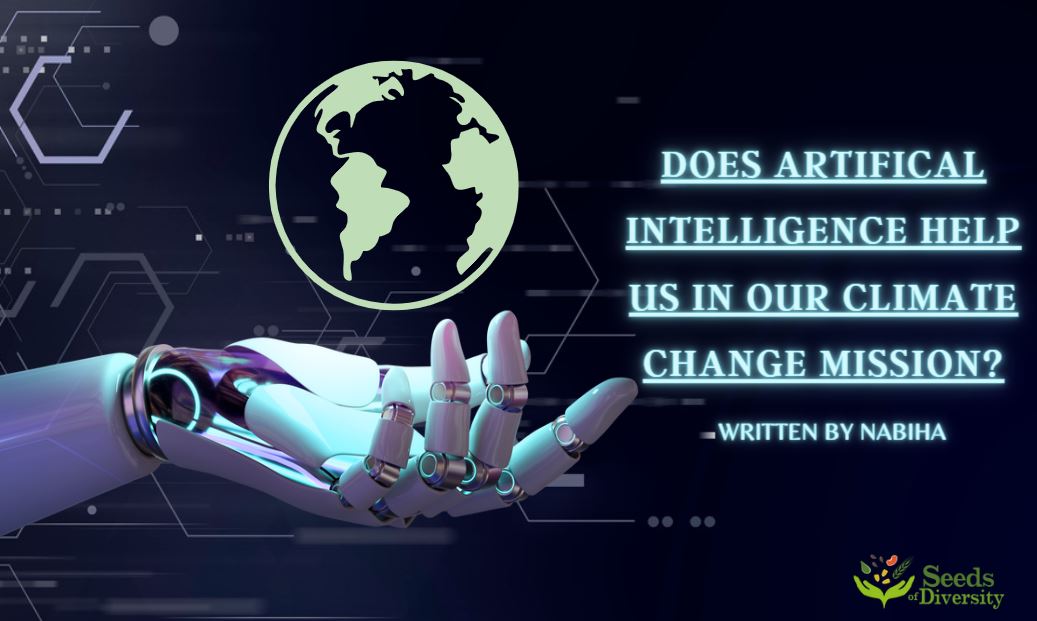Written By: Nabiha
Editted By: Cece Ndiwa
Designed By: Nabiha
Published By: Maryam Khan
Artificial Intelligence is well known for its many solutions to problems we have encountered thus far, but can it truly help us in our goal to end climate change if the earth gets damaged to make the AI in the first place? In this article, I will go over examples of artificial intelligence that have helped us with climate change, and determine if AI’s impact is bigger than the cost of making them.

Photo provided on Flickr
Before we begin, how much do we give up on making artificial intelligence? It’s estimated that even small AI teams can have a cost of $320,000 per year due to technological development costs. Bigger companies such as Netflix, Google or Amazon tend to spend more than $1.5 billion per year. Keep in mind that money like this can be used on other climate projects that scientists have been experimenting on.

Photo provided on Wikimedia Commons
Not only does it cost a lot, but producing AI can cost up to 626,000 pounds of CO2 equivalent or more. If you’re wondering how much this is, 20 pounds of CO2 would approximately fill 1200-gallon jugs. That means the amount of CO2 needed to produce AI would fill around 37 560 000 gallon jugs! That’s a lot of CO2 being produced, considering that many companies commonly produce and utilize AI, especially as technology becomes more advanced and essential in today’s world.
So is it worth it? This is subjective as AI has managed to help with a lot of climate problems. Just recently, AI has managed to give scientists a better view of the future of our planet. Unfortunately, it hasn’t brought much good news. It has warned us that our planet could warm up 1.5 degrees celsius in only a decade, which is much sooner than scientists anticipated. Nevertheless, this is a good reminder and warning for scientists and civilians to take better care of our planet before it’s too late.
This isn’t the only way AI has helped us before, as it has predicted and helped prevent many other disastrous situations. Considering that our world is now already feeling the effects of climate change, many are launching apps using AI to help others cope. One app specifically predicts the areas that have higher chances of flooding, saving many people’s lives who live there, as they can evacuate ahead of time. AI is also being used to effectively and efficiently use energy and water, since those two are becoming something that might hold more significant value due to climate change. Although it does not do much to help these problems, it at least is providing us with feedback on how to handle the effects of climate change.

Photo provided on Public Domain Pictures
Along with that, the government is already experimenting with AI to design more energy-efficient buildings, improve power storage and optimize renewable energy deployment using more environmentally friendly methods.
Many also debate that AI can remove existing emissions from the atmosphere, and it’s quite possible. Although scientists aren’t at that stage yet, they are experimenting to see what they can do. As our carbon emissions are getting out of hand, this is a valid solution to our problems.
So, is AI worth the trouble it causes? In my opinion, I would say specific AIs are worth it, while others don’t prove to be much beneficial in this situation. AIs that predict future catastrophes and assist in lowering carbon emissions are the ones that should be prioritized, as carbon emissions play a big role in climate change.
Although climate change might not seem like a big problem in our day-to-day lives, it will soon start affecting us if we don’t do something about it. I truly believe that AI can help us achieve our carbon emission goals if we focus on certain aspects of it.
Ultimately, AI is growing and becoming more advanced every day, and might one day save us from our climate change obstacles.

Photo provided on Free SVG
Sources:
Boston Consulting Group. https://web-assets.bcg.com/ff/d7/90b70d9f405fa2b67c8498ed39f3/ai-for-the-planet-bcg-report-july-2022.pdf.
Chiodo, Jennifer. “What Does a Ton of CO2 Look like?” Building Energy Resilience, 13 June 2012, https://buildingenergy.cx-associates.com/2012/06/what-does-a-ton-of-co2-look-like/#:~:text=Wondering%20how%20big%2020%20lbs,invisible%20gas.
Digitalization Free Stock Photo – Public Domain Pictures. https://publicdomainpictures.net/en/view-image.php?image=371621&picture=digitalization.
Edwards, Christian. “A Dire Forecast: Scientists Used AI to Find Planet Could Cross Critical Warming Threshold Sooner than Expected.” CNN, Cable News Network, 30 Jan. 2023, https://www.cnn.com/2023/01/30/world/global-warming-critical-threshold-climate-intl/index.html.
File:Money Cash.jpg – Wikimedia Commons. https://commons.wikimedia.org/wiki/File:Money_Cash.jpg.
MacKenzie, Mike. “Machine Learning & Artificial Intelligence.” Flickr, Yahoo!, 16 Aug. 2018, https://www.flickr.com/photos/mikemacmarketing/42271822770.
Majumder, Prateek. “The Carbon Footprint of AI and Deep Learning.” Analytics Vidhya, 1 Mar. 2022, https://www.analyticsvidhya.com/blog/2022/03/the-carbon-footprint-of-ai-and-deep-learning/#:~:text=AI%20and%20Energy&text=Researchers%20from%20the%20University%20of,626%2C000%20pounds%20of%20CO2%20equivalent.
Neslen, Arthur. “How Can Artificial Intelligence Help Fight Climate Change?” Context, Context, 5 Aug. 2022, https://www.context.news/nature/how-can-artificial-intelligence-help-fight-climate-change#:~:text=AI%20applications%20could%20also%20help,the%20electricity%20grid%20as%20needed.
Reilly, Jon. “A Cost Breakdown of Artificial Intelligence in 2022.” Akkio, Akkio, 3 May 2021, https://www.akkio.com/post/a-cost-breakdown-of-artificial-intelligence-in-2022#:~:text=After%20all%2C%20skills%20like%20data,in%20technology%20development%20costs%20alone.
Torkington, Simon. “3 Ways Technology Is Helping the World Adapt to Climate Change.” World Economic Forum, 1 Feb. 2023, https://www.weforum.org/agenda/2023/02/technology-climate-change-adaptation/.
Vedran. “OpenClipart.” Free SVG, https://freesvg.org/ecological-planet-vector-illustration.

